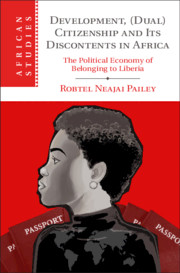 Development, (Dual) Citizenship and Its Discontents in Africa
Development, (Dual) Citizenship and Its Discontents in Africa Book contents
- Development, (Dual) Citizenship and Its Discontents in Africa
- African Studies Series
- Development, (Dual) Citizenship and Its Discontents in Africa
- Copyright page
- Contents
- Figures and Tables
- Acronyms
- Acknowledgements
- Introduction
- 1 Methodological, Theoretical, and Biographical Reflections
- 2 The Political Economy of Belonging to Liberia
- 3 Dual Citizenship and Its Discontents in Africa
- 4 Give Me Your Land or I’ll Shoot!
- 5 Between Rootedness and Rootlessness
- 6 The Dichotomy of Diasporic Developmentalism
- Conclusion
- Book part
- References
- Index
- African Studies Series
6 - The Dichotomy of Diasporic Developmentalism
Published online by Cambridge University Press: 07 January 2021
- Development, (Dual) Citizenship and Its Discontents in Africa
- African Studies Series
- Development, (Dual) Citizenship and Its Discontents in Africa
- Copyright page
- Contents
- Figures and Tables
- Acronyms
- Acknowledgements
- Introduction
- 1 Methodological, Theoretical, and Biographical Reflections
- 2 The Political Economy of Belonging to Liberia
- 3 Dual Citizenship and Its Discontents in Africa
- 4 Give Me Your Land or I’ll Shoot!
- 5 Between Rootedness and Rootlessness
- 6 The Dichotomy of Diasporic Developmentalism
- Conclusion
- Book part
- References
- Index
- African Studies Series
Summary
Chapter 6 interrogates the underlying assumption that Liberian diasporas and returnees are the remedy to reconstruction, with expanded discussions on post-war recovery challenges and successes, remittances, capital flight, and public sector graft. It demonstrates that while dual citizenship legislation was proposed with the intention of incentivising emigrants to contribute their time, talent, and treasure, backlash against the 2008 bill escalated due in part to fraud allegations implicating some returnees. Although recovery requires the active participation of Liberian transnationals in the political economy of belonging, a disproportionate number of diaspora recruits implicated in public sector graft cases has severely hobbled socio-economic transformation thereby justifying restrictions on non-resident citizenship.Moreover, post-war reconstruction as a political project has exposed the inherent tensions between external state-building agendas and internal nation-building aspirations which have produced conflicting outcomes for Liberian citizenship construction and practice. This chapter contends that one-size-fits all approaches to post-war recovery are fundamentally flawed because context matters.
Keywords
- Type
- Chapter
- Information
- Development, (Dual) Citizenship and Its Discontents in AfricaThe Political Economy of Belonging to Liberia, pp. 179 - 220Publisher: Cambridge University PressPrint publication year: 2021


